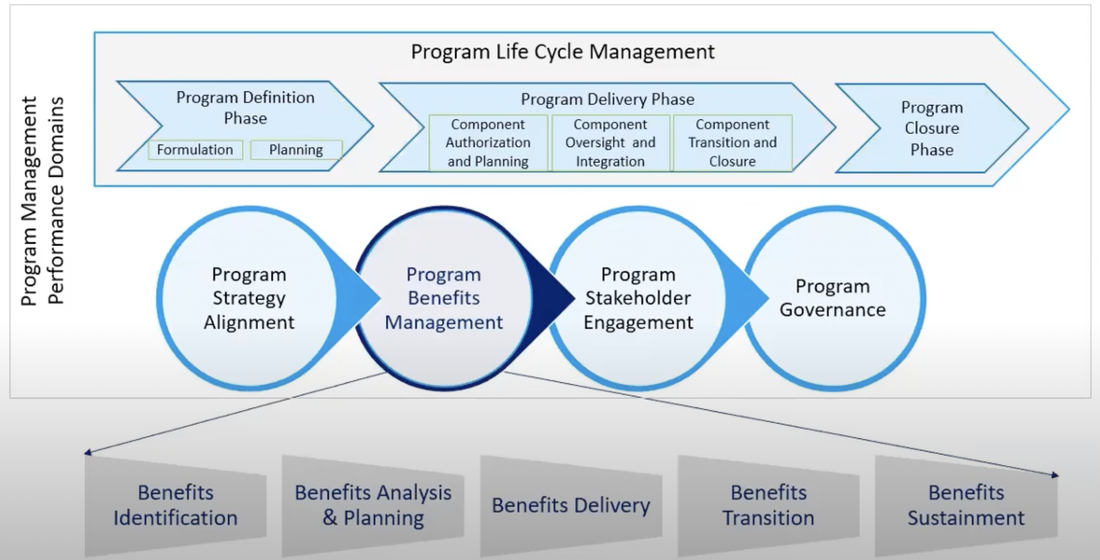|
A Program Manager is responsible for managing multiple interrelated streams of work and ensuring that - taken together - they produce specific business outcomes and benefits for an organization. However the title "Program Manager" is not very common. Organizations have Project Managers, Product Managers, General Managers. But apart from some large organizations, "Program Manager" is rare. This is because often executives and middle managers play the role of Program Manager even if they don't have the title. WHAT IS A PROGRAM?
A program has 3 main characteristics:
WHAT IS THE DIFFERENCE BETWEEN A PROGRAM AND A PROJECT? The main difference between a Program and a Project is that projects create deliverables, whereas programs create business outcomes and benefits. The deliverables of a project are usually tangible: easily recognized and validated. The benefits of a program could be tangible (e.g. a specific product, process or result) or intangible (e.g. improved morale, better capabilities). EXAMPLES OF PROGRAMS Programs can come in many different forms. Here are some examples:
In each example, you can see how the program combines multiple interrelated streams of work, produces a business outcome or benefits, and is time-bound. For example I have had a role where I led the launch of a new line of business within the organization. We were going to sell a new suite of data encryption software. I managed multiple interrelated streams of work that were multi-disciplinary (engineering, legal, sales, marketing, customer support). The business target outcomes were well-defined (e.g. $1M in new revenue within the first year, 3 landmark new customers) and I had to report on them regularly to leadership. And it was time-bound (the business line was to be set up within a year and then rolled into regular business operations). TURNING STRATEGY INTO REALITY The Program Manager is often the person who is responsible for transforming some aspect of the company's strategy into real results. The strategy is set by company leadership. The Program Manager then builds a plan that shows how some aspect of that strategy will be delivered and turned into business outcomes. Along the way, as the Program Plan is being developed, the Program Manager might uncover some aspects of the strategy that could be changed, and they can surface this to leadership. Similarly the Program Plan is presented to leadership and leadership can suggest changes to the plan. Strategy, plan, execution and results are interrelated. Often executive leadership is very busy, and their specialty is leading and communicating rather than execution. A Program Manager is their trusted execution partner, understanding their vision and then spending time with the project managers and teams crafting and then executing a plan to make it happen. DEFINING THE RIGHT OUTCOMES AND KPIS As opposed to a Project Manager that always delivers a concrete deliverable such as a working software product, a Program Manager delivers a benefit or business outcome which can sometimes be intangible (e.g. improved customer experience). It's therefore very important to establish what the business outcomes are and what KPIs will be used to measure their achievement:
RESPONSIBILITIES OF A PROGRAM MANAGER A Program Manager's responsibilities include:
DIFFERENCE BETWEEN A PROGRAM MANAGER AND A PROJECT MANAGER A Project Manager is focused on the creation of tangible deliverables, whereas a Program Manager is focused on producing business outcomes and benefits. PMI also distinguishes programs from projects along 3 dimensions:
DIFFERENCE BETWEEN A PROGRAM MANAGER AND A PRODUCT MANAGER At some companies like Microsoft, there is little difference between a Program Manager and a Product Manager. More often in practice, a Product Manager is an expert on a product that works with a delivery team to ensure the product is delivered in a way that it will be successful with customers. The Product Manager will be a subject-matter expert on the market, the market problems that the product must solve, and the detailed requirements that the product must meet to solve the market problems. Product Managers spend a good deal of their time being the spokesperson for the product, evangelizing to prospective customers and partners, and collecting and prioritizing customer requirements along the way. While they are closely involved in the delivery of the product, Product Managers are usually not directly responsible for product delivery. Two popular international standards for Product Managers are the Pragmatic Institute and 280 Group. DIFFERENCE BETWEEN A PROGRAM MANAGER AND A PORTFOLIO MANAGER Programs are also different from portfolios. Portfolios is a strategic collection of components that meets some business objectives. Programs have a definite timeframe, portfolios are not initiated with a time frame in mind. A program can be long and the duration may not even be known upfront, but they are by nature temporary. Portfolio managers are typically directly involved in strategic decision making, whereas Program Managers will advise and provide input into strategy but will be mostly focused on turning strategy into reality by delivering business outcomes and benefits. DIFFERENCE BETWEEN A PROGRAM MANAGER AND A GENERAL MANAGER A General Manager is typically focused on profit and loss (P&L) for a department or strategic initiative. This can be true of a Program Manager as well, but Program Managers typically deliver something within a period of time, whereas General Managers have an ongoing responsibility to operations. For example, a Program Manager might set up a new line of business within a year, and attain an initial revenue with customers. A General Manager is responsible for the ongoing operations of ya business unit, in particular the overall P&L for that business unit year-to-year. QUALITIES OF A PROGRAM MANAGER
PgMP IS THE STANDARD The Project Management Institute (PMI) currently maintains an international standard for Program Managers called PgMP methodology, summarized by the graphic below (see webinar Everything About PgMP). A lot of the focus is on producing business outcomes (called "Program Benefits Management", made up of 5 sub-parts: Benefits Identification, Benefits Analysis and Planning, Benefits Delivery, Benefits Transition, and Benefits Sustainment). See the study guide for PgMP here.
0 Comments
Your comment will be posted after it is approved.
Leave a Reply. |


